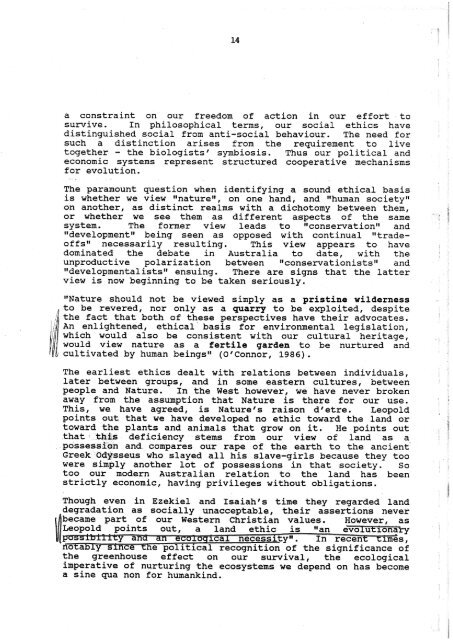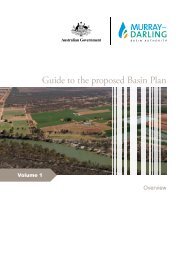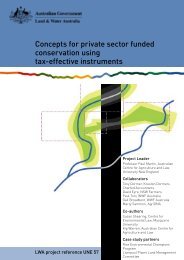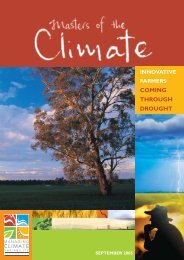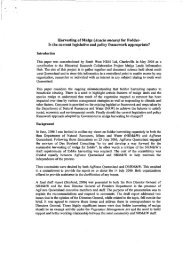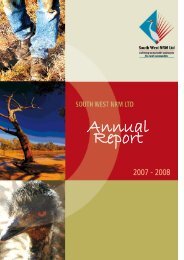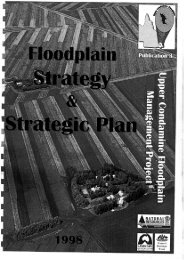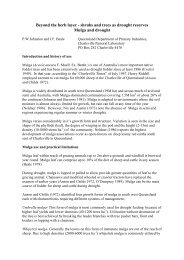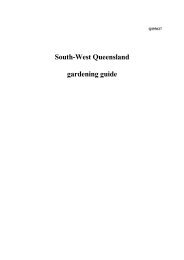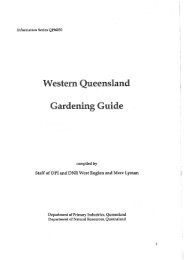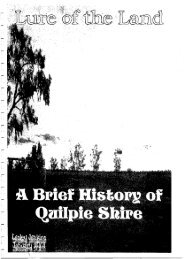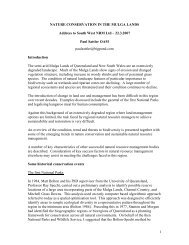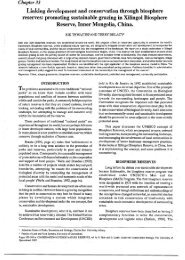soil-conservation-people-religion-and-land.pdf - South West NRM
soil-conservation-people-religion-and-land.pdf - South West NRM
soil-conservation-people-religion-and-land.pdf - South West NRM
You also want an ePaper? Increase the reach of your titles
YUMPU automatically turns print PDFs into web optimized ePapers that Google loves.
a constraint on our freedom of action in our effort to<br />
survive. In philosophical terms, our social ethics have<br />
distinguished social from anti-social behaviour. The need for<br />
such a distinction arises from the requirement to live<br />
together - the biologistsF symbiosis. Thus our political <strong>and</strong><br />
economic systems represent structured cooperative mechanisms<br />
for evolution.<br />
The paramount question when identifying a sound ethical basis<br />
is whether we view "nature", on one h<strong>and</strong>, <strong>and</strong> "human societytq<br />
on another, as distinct realms with a dichotomy between them,<br />
or whether we see them as different aspects of the same<br />
system. The former view leads to q'<strong>conservation</strong>ll <strong>and</strong><br />
lqdevelopmentlv being seen as opposed with continual "tradeoff<br />
sf' necessarily resulting. This view appears to have<br />
dominated the debate in Australia to date, with the<br />
unproductive polarization between ll<strong>conservation</strong>istsl~ <strong>and</strong><br />
vqdevelopmentalistsqt ensuing. There are signs that the latter<br />
view is now beginning to be taken seriously.<br />
"Nature should not be viewed simply as a pristine wilderness<br />
to be revered, nor only as a quarry to be exploited, despite<br />
the fact that both of these perspectives have their advocates.<br />
An enlightened, ethical' basis for environmental legislation,<br />
which would also be consistent with our cultural heritage,<br />
would view nature as a fertile garden to be nurtured <strong>and</strong><br />
cultivated by human beings" (OrConnor, 1986).<br />
The earliest ethics dealt with relations between individuals,<br />
later between groups, <strong>and</strong> in some eastern cultures, between<br />
<strong>people</strong> <strong>and</strong> Nature. In the <strong>West</strong> however, we have never broken<br />
away from the assumption that Nature is there for our use.<br />
This, we have agreed, is Nature's raison dretre. Leopold<br />
points out that we have developed no ethic toward the l<strong>and</strong> or<br />
toward the plants <strong>and</strong> animals that grow on it. He points out<br />
that this deficiency stems from our view of l<strong>and</strong> as a<br />
possession <strong>and</strong> compares our rape of the earth to the ancient<br />
Greek Odysseus who slayed all his slave-girls because they too<br />
were simply another lot of possessions in that society. So<br />
too our modern Australian relation to the l<strong>and</strong> has been<br />
strictly economic, having privileges without obligations.<br />
Though even in Ezekiel <strong>and</strong> lsaiahJs time they regarded l<strong>and</strong><br />
the greenhouse effect on our survival, the ecological<br />
imperative of nurturing the ecosystems we depend on has become<br />
a sine qua non for humankind.


